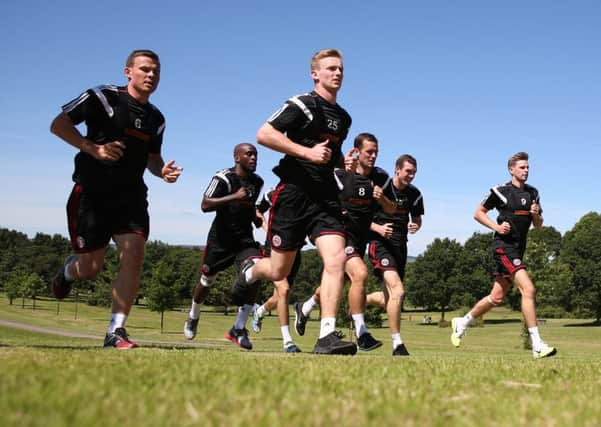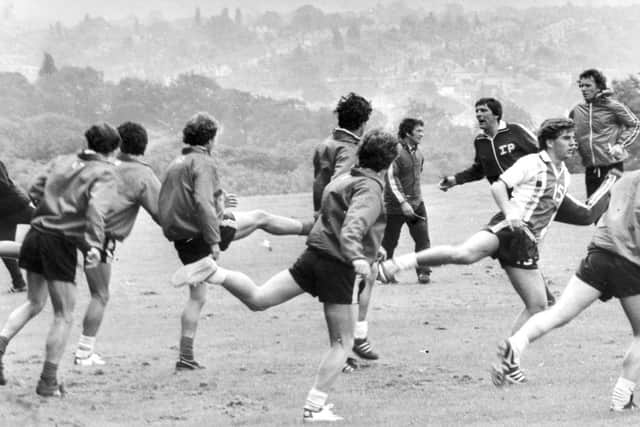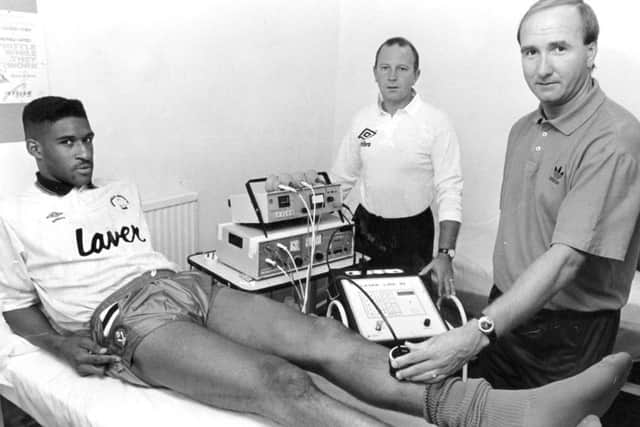Sheffield United: The changing face of pre-season training, from Brian Deane to George Long


But the ritual perhaps isn’t as torturous as it once was.
Gone are the days of rolling seven-mile runs and players turning up hugely overweight; instead, as George Long reveals, Sheffield United will report back to their Shirecliffe training base this morning relaxed and ready to work.
“It will be an intense pre-season, I’m sure,” the 22-year-old goalkeeper smiles.
Advertisement
Hide AdAdvertisement
Hide Ad“But we have come to expect that. We’re all experienced players now and we will come back and work hard.
“The lads haven’t been putting their feet up in pre-season, we’ve been ticking over and making sure we come back in great shape.
“This isn’t the time to come back and shed weight to get fit... you want to come back and hit the ground running.”


Chris Wilder’s United begin their pre-season campaign at Stocksbridge Park Steels on July 9, before facing Grimsby Town, Derby County and Handsworth Parramore ahead of the big season kick-off on August 6.
Advertisement
Hide AdAdvertisement
Hide AdBut the United boss hasn’t totally written off some of the more traditional methods favoured by the likes of Dave Bassett, who led United - and Wilder - into the top flight. In 2013, Wilder led his Oxford United team to an army camp where they slept on the Moors without tents.
“There are a lot of good things from modern-day football,” Wilder said at the time, “but a lot of the values from my era have stuck with me throughout my career; playing, coaching and managing.
“I think it’s about getting a mix of old and new techniques, and a well-rounded player will have that balance right.”


Bassett was forward thinking, too: “Under Dave, we were one of the first teams to embrace it,” Brian Deane, the Blades legend, remembers.
Advertisement
Hide AdAdvertisement
Hide Ad“I remember he brought in a fitness coach called Ed Baranowski and things changed after that.
“The manager was quick to realise that although we may not have been as good as some of the other teams, we could try and be fitter than them and that worked in our favour.
“I think teams started to use that more and now we are at the point where fitness is the most important factor.”


Deane, who began his career in the mid 1980s and retired in 2006, saw the cultural shift first-hand and remembers the running-heavy early days not-so-fondly: “We would come in and barely see a ball for days or weeks,” he added.
Advertisement
Hide AdAdvertisement
Hide Ad“It was very, very tough and back then there were some who would try and get out of it in some way.
“The older players would have a word with the younger ones and tell them not to go too fast, to not embarrass them. That was wrong, obviously, but it happened.”
It wouldn’t now. The rise in technology sees players fitted with GPS trackers under their shirts, calculating and recording every move, heartbeat and breath.
Players are prescribed tailored training plans, rather than a one-size-fits-all schedule which sees goalkeepers, 5ft 6in wingers and towering strikers all doing the same work-outs, and recovery can be personalised to suit.
Advertisement
Hide AdAdvertisement
Hide Ad“One of the changes to the modern game is the level in which we can analyse the movement quality, function and form,” says Dave Hembrough, sport science officer at Sheffield Hallam University - who have links with both United and city rivals Sheffield Wednesday.


“With football being a game which has got such huge finance attached to it, it’s very expensive to have players picking up niggles or becoming injured.
“The last thing the clubs want is for players to be removed from action. It’s really important, a huge part of the conditioning programme.
“What we are starting to see at the minute from professional sports, football leading the way, is the amount of analysis and individualisation of training prescription, fitness is not longer the determining factor because everyone is at an even keel.
Advertisement
Hide AdAdvertisement
Hide Ad“What clubs are now looking for is technological advancements or very specific approaches to what is the determining factor to make a significant difference, be that sports psychology, supplementation, nutrition.
“Fitness, strength, conditioning, the ability to resist injury is really important but in many cases it’s pretty high and clubs are looking for additional factors that can make a difference.
“Some of the things that were impossible in the past are now standard.
“Things that modern technology enables us to do is to measure everyone, to monitor everyone and have expectations and standards.”
Advertisement
Hide AdAdvertisement
Hide AdAlthough sadly, for players without clubs or with niggling injuries, all the modern technology in the world simply can’t replicate the benefits of a full pre-season campaign.
“You are facing a tough battle if you don’t have a pre-season,” Hembrough added.
“The percentage of improvement over a pre-season is massive and it sets you up, not just to be able to play well over a season but to tolerate what is expected of you during the season.
“The chances are that a player that misses a pre-season for whatever reason, comes back and is not going to be able to deal with the volume and intensity of training and fixtures, he’s going to be behind on his fitness and will need to do additional work.
Advertisement
Hide AdAdvertisement
Hide Ad“Arguably, he’s not in a position where he is able to cope.”
Put simply, pre-season has tangible benefits for both fitness and team spirit. Proof, if it were needed for any player, that there is method behind the madness.